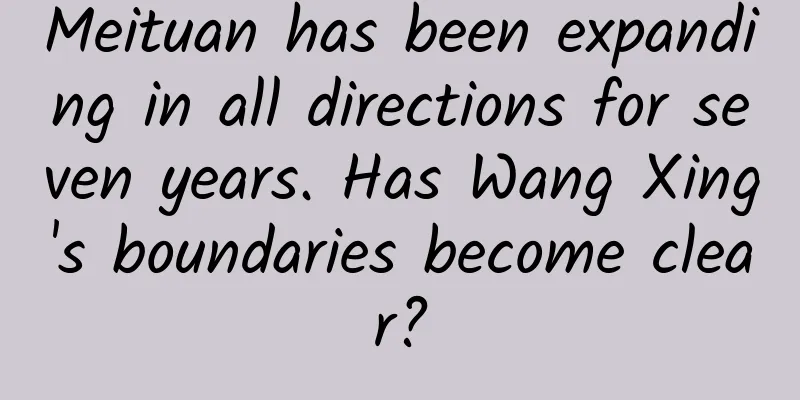Meituan has been expanding in all directions for seven years. Has Wang Xing's boundaries become clear?

|
Three weeks ago, news broke that Meituan had raised $3 billion in financing. This was the second financing rumor for Meituan this year. The last time was in May, when it was reported that major shareholder Tencent refused to lead the investment. Afterwards, Meituan denied the allegations. Senior Vice President Chen Shaohui also said: "Meituan Dianping's overall business has achieved break-even, revenue has increased by triple digits year-on-year, the company has ample cash, and actual cash reserves on the account have exceeded US$3 billion." But Meituan's abundant cash does not mean it does not need financing, because it has opened up too many battlefields that require burning money: earlier food delivery, hotels, movie tickets... the taxi service launched in February this year, the homestay launched in April, and the offline store Zhangyu Fresh opened in July. On August 15, Meituan entered the shared power bank business, opening up a new business line. Meituan's practice of not setting boundaries and making enemies everywhere has been questioned. When Caijing magazine interviewed Wang Xing and asked him about "boundaries", Wang Xing replied: "There are actually no simple boundaries for everything, so I don't think I should set limits for myself as long as the core is clear." This statement has once again put Meituan at the center of controversy. Looking back at Meituan’s development history, AI Finance and Economics found that in fact, Meituan’s cross-category expansion has weakened in the past two years, and the boundaries have gradually become clear. Meituan's development has gone through three stages: before 2013, the stage of thousands of groups competing with each other, through ground promotion, to grab merchants and markets; from 2013 to 2015, the T-shaped strategy stage, under the "horizontal" group buying, more than ten vertical categories emerged, such as hotels, movies, takeaways, KTV, beauty, mother and baby, cleaning, etc.; after 2016, the "troika" strategy, only four new businesses were added (taxi, homestay, shared power bank, and Zhangyu Fresh), and all of them were centered around catering, hotel travel, and in-store comprehensive development. Among these three stages, Meituan’s cross-category expansion was most rapid in the second stage. So why is the controversy intensifying at this stage? In addition to the fact that Meituan is in a market with the most intense and even brutal competition, the bigger reason is that Meituan, which was established seven years ago, is at a crossroads of capital: if it continues to raise funds in the private equity market, what will be its valuation, and who can support such a behemoth? If it goes public, how can it get rid of the imprint of Groupon, the originator of group buying? These issues are combined into one question in the eyes of onlookers: Is Meituan's business expansion to improve its business lines or purely to tell a story for capital after listing? This makes people unclear. Missing Boundaries Many people have not noticed that Meituan rarely mentions the "T-shaped strategy". However, in the three years from 2013 to 2015, the "T-shaped strategy" was a high-frequency word in Meituan's external publicity and in Wang Xing's internal speeches. In the second half of 2016, some media even used it to analyze Meituan's future trends. Wang Xing started thinking about Meituan’s “T-shaped strategy” in 2012 - group buying is the horizontal, and vertical fields are the vertical. Group buying is just the entrance, and how deep Meituan can go in the vertical field determines its moat. The idea is that if Meituan wants to increase user stickiness, it needs to inject more consumption scenarios. After eating, you can check what movies are available nearby, and after watching a movie, you can also check what hotels are nearby. As user stickiness increases, the customer order will also increase accordingly. Maoyan Movies became an independent business group in 2014, which was an important step in the "T-shaped strategy". Previously, all vertical businesses had a common sales team, but after Maoyan became independent, it had an independent supply chain system and sales team. Since then, hotels, food delivery, etc. have also followed this path and established their own supply systems and sales teams. But this also brings up a question: where is the boundary of the T-shaped strategy? Local life services cover all walks of life, and each sub-segment is a huge market, which Meituan cannot cover comprehensively. As early as 2014, the media asked Wang Xing this question. At that time, Wang Xing said: "A company cannot achieve all the sub-segments. It must do what it should and not do what it shouldn't." Meituan will focus on doing well in the high-frequency categories of food, drink and entertainment, and other sub-segments may be achieved through cooperation, either at the business level or at the capital level. What this means is that Meituan does the high-frequency activities on its own, and does the low-frequency activities through equity investment and other means. According to incomplete statistics, from 2013 to 2015, Meituan entered into more than ten categories, including movies, food delivery, catering, hotels, scenic spot tickets, parent-child, wedding, physical e-commerce, etc. In 2015, when O2O was popular, it even provided door-to-door services such as manicure, cleaning, lock repair, and car washing. The expansion was crazy, and the boundaries between what to do and what not to do were becoming increasingly blurred. It is no wonder that an investor at the time described Meituan as a "mace": If compared with weapons, Meituan is like a big stick, not sharp enough, but it is big and has many possibilities. Now we need to insert needles into the stick. How many needles to insert and where to insert them are the more important things for Meituan now. "When enough needles are inserted, this big stick becomes a mace." The collapse of the T-shaped strategy The T-shaped strategy lasted for three years, with Maoyan Film as its symbol. Its independence marked the first step of the T-shaped strategy, and its sale also marked the end of the strategy. In May 2016, Enlight Media acquired a total of 57.4% of the shares of Maoyan Film through two companies, thus achieving a controlling stake in Maoyan Film. Looking back at this merger, a film industry practitioner believes that Wang Xing's decision was a smart one. He told AI Finance that it is difficult to make money from selling movie tickets alone. Usually, it is necessary to cooperate with film investment, publicity and distribution to gain profit margins. The possibility of Meituan establishing a film company that runs through the industry chain is zero. In this case, selling it is a good choice. "This is conceivable in the territory of Guangguang, but for Meituan, selling movie tickets is completely a wedding dress for others." Corroborating this statement, Xu Wu, the founder of Maoyan Movies, once mentioned in an interview with Li Zhigang that Meituan Movies (not yet renamed Maoyan) had to pay money to the ticketing system for every ticket sold. At that time, the profit of a group purchase of a ticket on Meituan was only 1 yuan, and the ticketing system asked for a commission of 2 or 3 yuan from Meituan Movies. The merger of Maoyan Film into Light Media has caused Wang Xing's firm belief in the "T-shaped strategy" to become controversial internally. Defenders believe that this is a masterpiece of successful asset operation that can boost Meituan's platform value, while critics question the waste of corporate focus by "raising a son for others." Afterwards, Meituan showed a cautious attitude towards the expansion of new businesses and did not invest a lot of manpower, material and financial resources to build a vertical business line of a certain scale. In addition to Maoyan Movies, Meituan also shut down physical e-commerce, O2O door-to-door service, breakfast and other businesses from the end of 2015 to 2016. These businesses were gradually marginalized due to low order volume, or had low customer orders and high investment and were difficult to make a profit. After going around in a circle, the horizontal line on the T-letter gradually weakened. Since October 2016, Meituan has been promoting the "City Partner" program, involving 1,200 cities and counties. The agency scope includes restaurant group buying, promotion, payment and other businesses, and the revenue model is "group buying gross profit sharing + assessment bonus + other products". Meituan officials described this project as part of the implementation of Meituan's "building a platform and building an ecosystem" strategy. However, more than half of these counties and cities were previously directly-operated cities. Meituan's move actually converted the group-buying directly-operated cities into agency cities, and thousands of grassroots sales staff were laid off in disguise. Meituan's "core competitiveness" used to be to acquire merchants and customers through a strong group-buying ground-promotion team. This allowed Meituan to quickly take the top spot in the group-buying field. There is no official data on the number of people in Meituan's group-buying ground-promotion team. A widely circulated saying is that Meituan and Dianping now have 35,000 employees, of which 25,000 are sales and ground-promotion. As a product of the PC Internet era, the group-buying consumption model has gradually declined in the mobile Internet market environment. And with the merger with Dianping, Meituan has secured its position as the only dominant company. The former core competitiveness has now become a burden. For Meituan, de-grouping will become the norm. The new troika After 2016, Wang Xing rarely talked about the T-shaped strategy, and instead replaced it with the "three-horse team". In November 2015, Meituan Dianping announced the organizational structure adjustment after the merger, and established five business groups: platform business group, in-store catering business group, in-store comprehensive business group, food delivery business group, and hotel and tourism business group. After three adjustments, in January this year, Wang Xing announced the formation of the three pillars of catering, hotel and tourism, and comprehensive (local life services other than catering) in the form of an internal letter. In these three major business structures, the original in-store catering business group, food delivery business group and catering ecological platform levels were cancelled and unified into the catering platform. The person in charge of the catering platform is Meituan veteran Wang Huiwen as president; the hotel and travel business group was merged with the original Meituan platform to form the platform and hotel and travel business group, with Chen Liang, the original hotel and travel business group, as president; the comprehensive business group and the Dianping platform were merged to form the Dianping platform and comprehensive business group, with the newly joined Zhang Chuan (former executive vice president of 58 Group) as president. Meituan's "three pillars" are facing fierce competition in their respective fields. The hotel and travel business faces strong pressure from Ctrip; in the catering field, Ali Koubei, Ele.me, Baidu Nuomi + Waimai, etc. are still Meituan Waimai's competitors. Throughout 2016, Meituan was stuck in a stalemate with its competitors in its core business and did not make any moves to expand its business. It was not until February this year that Meituan launched its taxi business in Nanjing. According to Wang Xing’s statement in an interview with Caijing magazine, the reason why Meituan started the taxi-hailing business was because it was a location-based service (LBS), and “a large part of Meituan’s business characteristics are related to location.” However, Meituan has not made a big bet on the taxi business. It is more like a test run. After half a year of operation, it is limited to Nanjing and has spent a lot of money. There is no sign of expansion. It is more likely to combine the taxi service with other products of Meituan Dianping, such as food delivery (similar to UberEats) or hotel airport pick-up. After the three major businesses were confirmed, Meituan’s internal exploration basically revolved around the three major businesses. In April, Meituan's hotel and travel business group launched Hazelnut Homestay, which was managed by Feng Weihe, a post-90s employee. In July, the retail business incubated by the catering platform took shape, and the first physical store Zhangyu Fresh opened in Wangjing. This means that Meituan's business layout is very different from the T-shaped strategy stage. A former Meituan mid-level manager told AI Finance that Meituan does not have a clear plan for the expansion of new businesses. It is probably just a small team that will explore the work internally first, and if they do well, more resources will be allocated to them. Can Meituan still go public? No company's diversification strategy has ever received such widespread attention and questioning as Meituan Dianping. Some people even worry whether Meituan's "scatter-net" expansion will make it the second LeTV. One reason for the intense controversy is that Meituan, which has been established for seven years and has reached a certain scale, is already on the verge of going public. Whatever it does will be linked to the listing. This speculation is not without reason. Before last year's National Day, Wang Huiwen, president of Meituan's catering platform, sent an internal email saying that the company would begin to pursue profitable growth, so in the future the sales team would no longer use transaction volume as a measurement indicator, but revenue as performance. This means that Meituan has begun to shift from pursuing scale growth to pursuing profitability. The outside world interprets this information as Meituan's listing has been put on the schedule and it has begun to prepare financial data to pave the way for the listing. But Meituan remained tight-lipped about the listing. Eastland, director of Huxiu Research, divides companies into three categories based on mid- to long-term valuations: The first category is pigs, with an estimated market value of between US$1 billion and US$5 billion when they go public, and expected to reach around US$10 billion a few years after listing; the second category is elephants, with an estimated market value of more than US$15 billion when they go public, and expected to reach US$50 billion or even US$80 billion a few years after listing; the third category is dinosaurs, of which only AT currently has a market value of more than US$80 billion. If it is the first type of enterprise, it should be listed when it has reached its "weight". If it delays, it will not gain weight and may even lose fat. For example, when Thunder went public in 2014, it had already missed its peak period. If you have the gene of an elephant, going public early is a failure for both entrepreneurs and investors. This belief is the root of investors' investment in rounds of higher and higher rounds. For example, JD.com, starting from Capital Today, investors have persisted for 7 years and invested a total of 2 billion US dollars. If there was no confidence, JD.com could have strived to go public in 2012 with a valuation of 6 billion to 8 billion US dollars, and there would not be the current market value of 60 billion US dollars. So which one does Meituan belong to? Wang Xing believes it is the third category: "Meituan has the opportunity to become a company of the same magnitude as A and T, because we have created enough value. Each of the catering, travel, and in-store comprehensive categories can be worth tens of billions of dollars. But it will take a long time, at least five to ten years." The investors behind the scenes have already waited for seven years. Do they still have the confidence to wait another ten years for Meituan to become a "dinosaur"? As a winner of Toutiao's Qingyun Plan and Baijiahao's Bai+ Plan, the 2019 Baidu Digital Author of the Year, the Baijiahao's Most Popular Author in the Technology Field, the 2019 Sogou Technology and Culture Author, and the 2021 Baijiahao Quarterly Influential Creator, he has won many awards, including the 2013 Sohu Best Industry Media Person, the 2015 China New Media Entrepreneurship Competition Beijing Third Place, the 2015 Guangmang Experience Award, the 2015 China New Media Entrepreneurship Competition Finals Third Place, and the 2018 Baidu Dynamic Annual Powerful Celebrity. |
<<: Huawei is going to make chips. Does that mean AI startups will be out of business?
Recommend
Free is the best strategy to attract new customers
During this year's epidemic, in addition to v...
The logic and method of operating a Zhihu account at zero cost
Zhihu started operating in September 2019, and it...
National Industrial Information Security Development Research Center: Panorama of Socialized Digital Supply Chain in 2021
Recently, the National Industrial Information Sec...
BYD: BYD has applied for more than 48,000 patents worldwide
According to recent news, BYD released an announc...
For life,
...
Forbes columnist: Why I said Xiaomi wants to acquire Xunlei
[[138837]] Yesterday, Xunlei CEO Zou Shenglong pu...
The fabric as thin as a cicada's wing is actually a "silencer"!
Produced by: Science Popularization China Author:...
Is it enough for Jio Router to establish its position through three generations of upgrades?
Ubiquitous smart technology has fueled the popula...
The first batch of mobile phone versions of "electronic business licenses" in the country are piloted: Alipay mini-programs are available for use
Still waiting in line at the counter to get your ...
How to create hot marketing activities and specific implementation plans!
In the early morning of July 27, I saw several on...
What is the truth behind the popularity of the APP "Catch Dolls Everyday"?
Recently, I often see advertisements for the Tian...
The glory of "Chinese products" in the Song and Yuan Dynasties! Its exquisite craftsmanship impressed the world and sold well in many overseas countries
The lotus-petal-patterned bowl from the Song Dyna...
Counterpoint: Global cellular IoT module shipments fell 2% in Q3 2023
According to the latest data from Counterpoint, g...
Summary and conclusion of Apple Store and Google Play app releases!
App release has become a crucial part of the prod...









